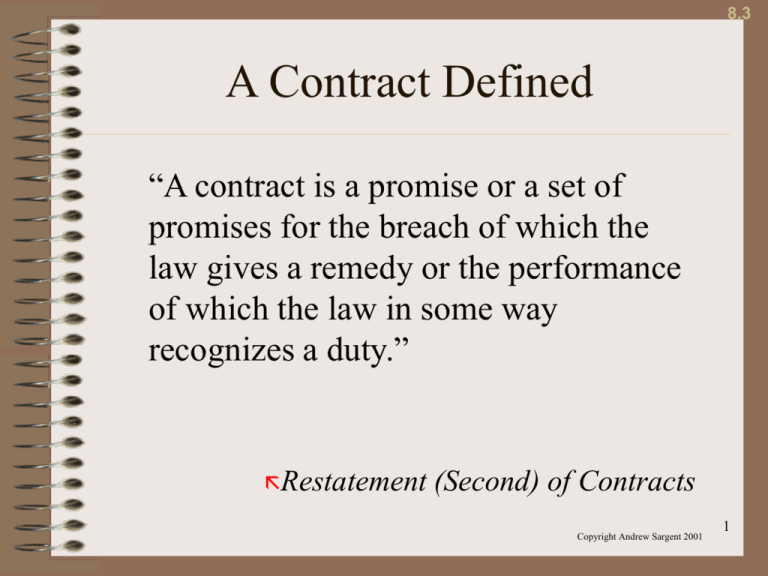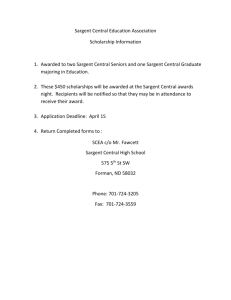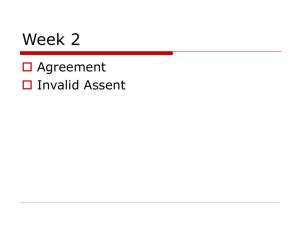Contracts Law
advertisement

8.3 A Contract Defined “A contract is a promise or a set of promises for the breach of which the law gives a remedy or the performance of which the law in some way recognizes a duty.” Restatement (Second) of Contracts Copyright Andrew Sargent 2001 1 8.6 Sources of Contract Law • Common Law of Contracts – Developed from early court decisions that became precedent for later decisions. – Limited federal common law, but large body of state common law. • Uniform Commercial Code – Created a uniform system of commercial law throughout the U.S. Applies to “goods”. Copyright Andrew Sargent 2001 2 Types of Contracts Based on Expression • Implied-in-Law Contract – – – 8-5 Quasi-contract Legal remedy to prevent unjust enrichment You notice that your neighbor’s child is mowing your grass (as he/she has done in the past) and you say nothing - you will be expected to pay a fair value for this service Copyright Andrew Sargent 2001 3 Check List for K Analysis • • • • • • Offer Acceptance Consideration Writing Capacity Legality/Public Policy Issues Copyright Andrew Sargent 2001 4 Definitions - Offer & Acceptance • An offer is an objectively reasonable communication that creates the power of acceptance in the offeree. • An acceptance is the unqualified agreement to the offer • Each has required parts of course. Copyright Andrew Sargent 2001 5 Elements of Offer & Acceptance • Offer (ppst); [UCC] – Parties – Price – Subject – Terms • Acceptance (cat) – Communicated – Absolute – Timely Copyright Andrew Sargent 2001 6 9.6 Termination of an Offer Termination by acts of the parties © SoftKey Revocation by offeror Counteroffer by offeree Rejection by offeree 7 9.7 Termination of an Offer Termination by Operation of the Law Destruction of subject matter Lapse of time Death or incompetency Supervening illegality 8 Options • Common Law • UCC 9 9.8 Acceptance • Only an offeree can accept the offer. • Offeree’s acceptance must be unequivocal. Also applicable is the mirror image rule. • Acceptance must be properly dispatched. Effective upon dispatch. • Silence does not usually mean acceptance. • Offeree must accept the offer by authorized communication, sometimes specific. Copyright Andrew Sargent 2001 10 Consideration Motivating Influence • • • • • • 8-9 What is it? Do something you do not have to do. Do not do something you have the right to do. What to look for in facts – What does offeror expect? What does offeree expect? Copyright Andrew Sargent 2001 11 Consideration Benefit-Detriment Analysis • • • 8-10 Bill promises to pay $75 for Betty’s collection of CDs; Betty promises to deliver the CDs upon payment of $75 What is consideration? Actual performance or the mutual promises? Copyright Andrew Sargent 2001 12 Consideration • • • 8-11 Betty promises to pay $200 when Bill has climbed the flag pole. Where is consideration now? Issue of Adequacy - not generally a matter of concern Copyright Andrew Sargent 2001 13 9.10 Contracts Lacking Consideration Illusory promises Moral obligations Preexisting duty © SoftKey Past consideration Illegal consideration 14 Voidable Contracts Competent Parties & Other Public Policy Issues • Minors – – – • Incapacitated Adults – • – 8-12 • Insane; intoxicated Mistake – • Power to avoid obligation Return existing consideration Necessaries Bilateral -- voidable agreement Unilateral -- enforceable agreement Fraud/Misrepresentation Duress & Undue Influence Copyright Andrew Sargent 2001 15 10.6 Illegal Contracts Gambling statutes Usury laws Contracts in restraint of trade Exculpatory clauses Covenants not to compete Immoral contracts 16 10.9 Unconscionable Contracts • Courts will uphold a contract if the following are present: – – The contract is for lawful purposes, and All other elements of the contract are met. • Courts are given discretion in determining conscionability. Copyright Andrew Sargent 2001 17 10.10 Elements of an Unconscionable Contract Parties possessed severely unequal bargaining power. Dominant party used bargaining power to gain advantage. The other party had no reasonable alternative. 18 10.11 Remedies for Unconscionability The entire contract may be set aside. The unconscionable part may be set aside. Limit the applicability of unconscionable part to avoid further damage. 19 Formality of Contracts • • • 8-13 Orally Stated v. Written Document – General Rules Statute of Frauds – Types of Cases • Interest in Land • Secondary Promise • Performance Beyond One Year • Goods over $500 Parol Evidence Rule Copyright Andrew Sargent 2001 20 Remedies for Breach • Damages – Compensatory – Consequential (forseeability factor) – Liquidated damages – Nominal damages – Rescission and restitution • Equitable remedies – Specific performance and injunctions – Reformation 21 Implied Warranties and UCC • Merchantability; Fitness for a Particular Purpose; Title; Non-Infringement – “Prominent” disclaimers 22 E-Commerce Issues • “Click-wrap”, “Shrink-wrap”, etc. agreements and Pro CD, Inc. v. Ziedenberg, 86 F.3d 1447 (1996) 23







